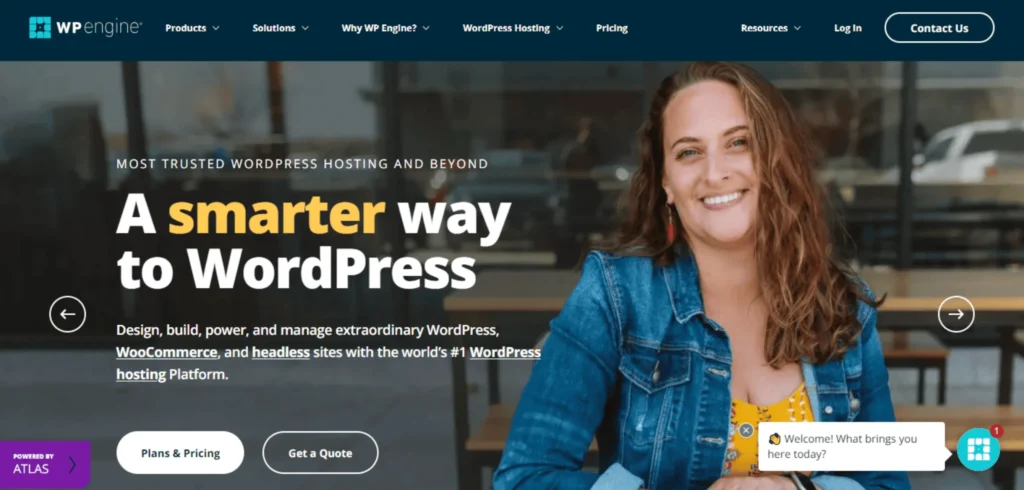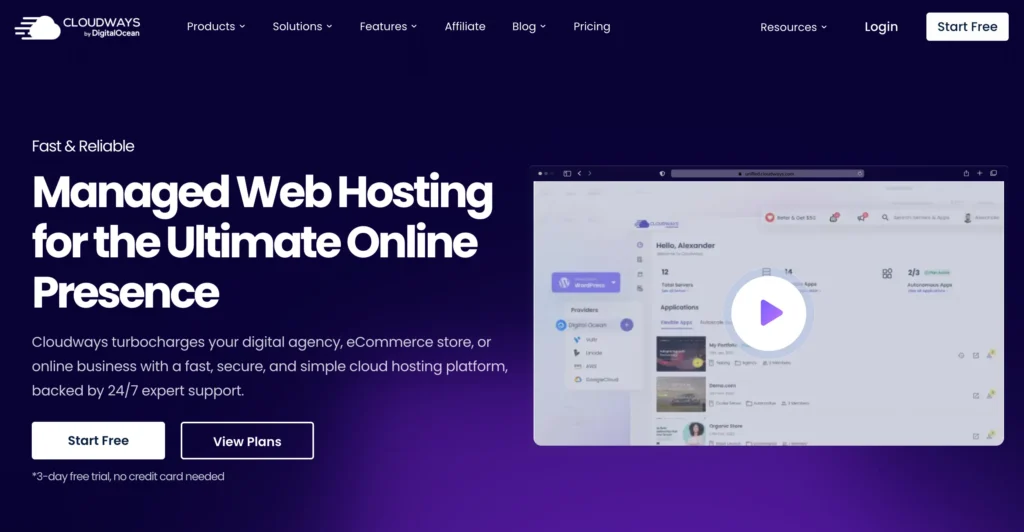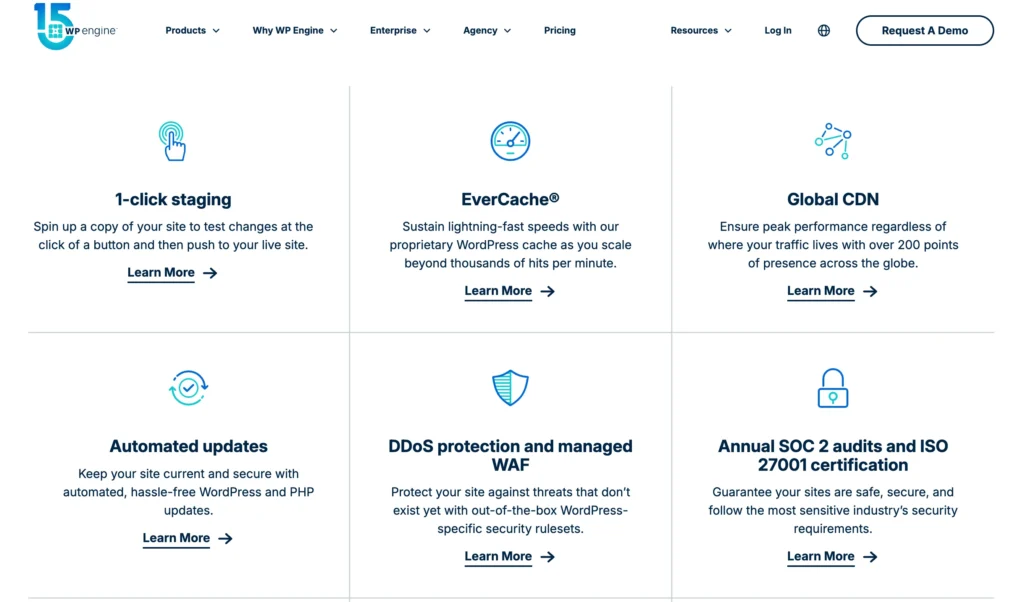Choosing the right hosting provider for your WordPress site can feel like picking the perfect coffee order—there’s a lot to consider, and everyone’s tastes are different.
WP Engine and Cloudways are two heavyweights in managed WordPress hosting, each with loyal fans and unique strengths. But which one’s better for you?
I’ve scoured 2025 reviews, tested both platforms, and put together this head-to-head comparison to help you decide. Let’s dive in with a conversational vibe and break down their features, performance, pricing, and more in simple English.
Table of Contents
ToggleWhat Are WP Engine and Cloudways?
WP Engine is a premium managed WordPress hosting provider founded in 2010 in Austin, Texas. It’s all about WordPress—think optimized servers, automatic updates, and a polished experience tailored for businesses, developers, and high-traffic sites.

It powers over 1.5 million sites, including big names like Yelp and National Geographic, and is known for speed, security, and top-tier support.
Cloudways, launched in 2011 and based in Malta, takes a different approach. It’s a managed cloud hosting platform that lets you choose from top cloud providers like DigitalOcean, AWS, Google Cloud, Linode, or Vultr.

Cloudways handles the techy server stuff, making cloud hosting accessible for WordPress users who want flexibility and performance without the hassle of managing servers.
Both are awesome for WordPress, but they cater to slightly different needs. Let’s compare them across key areas to see who comes out on top.
Features: What Do You Get?
WP Engine Features

WP Engine is like a luxury WordPress suite. Here’s what you get:
- WordPress Optimization: Servers are fine-tuned for WordPress, with EverCache® and LightSpeedWP for blazing-fast load times.
- Free CDN and SSL: A global Cloudflare CDN and free SSL certificates boost speed and security.
- Daily Backups and Staging: Test changes in a sandbox and restore your site with one click.
- Premium Themes: Access 10+ StudioPress themes (worth $2,000+) built on the Genesis Framework.
- Developer Tools: Git integration, SSH access, and transferable sites for agencies.
- Security: Daily malware scans, firewalls, DDoS protection, and free hack fixes.
- Support: 24/7 WordPress experts via live chat, phone (except Startup plan), and tickets.
A 2025 WebHostingCat review praised WP Engine’s staging environments and migration tools, calling them “game-changers for developers.”
Cloudways Features
Cloudways is like a customizable sports car—you pick the engine (cloud provider) and tweak it to your needs. Key features include:

- Cloud Provider Choice: Choose DigitalOcean, AWS, Google Cloud, Linode, or Vultr for your server.
- Advanced Caching: Varnish, Redis, Memcached, and Redis Object Cache Pro for top-notch speed.
- Free CDN: Cloudflare Enterprise (optional, $5/month per domain) with Argo Smart Routing and image optimization.
- Flexible Scaling: Adjust server resources on the fly to handle traffic spikes.
- Security: Free SSL, dedicated firewalls, IP whitelisting, and two-factor authentication.
- Backups: Automated or on-demand backups, with offsite storage (hourly backups cost $0.50/GB).
- Support: 24/7 live chat and ticketing, with premium support add-ons for faster responses.
A 2025 HostAdvice review loved Cloudways’ flexibility, noting you can “choose your cloud provider and scale resources easily.”
Winner: It’s a tie. WP Engine’s WordPress-specific tools and premium themes are perfect for a seamless experience. Cloudways shines with its cloud provider options and advanced caching, ideal for those who want control.
Performance: Who’s Faster?
Speed is king for WordPress sites—faster sites keep visitors happy and rank better on Google. Both hosts deliver, but here’s how they stack up.
WP Engine Performance
WP Engine uses Google Cloud and AWS servers optimized for WordPress. Its EverCache technology and free CDN ensure quick load times. In 2025 tests:
- A HostingStep review recorded an average TTFB (Time to First Byte) of 414ms.
- WebHostingCat noted WP Engine’s consistent speeds, though a test site scored 41% for overall performance, with a 4.1-second LCP (Largest Contentful Paint).
- Uptime is solid at 99.95%, backed by an SLA with credits for downtime.
Some reviews, like one from G2, mentioned occasional outages, but WP Engine’s infrastructure handles most traffic well.
Cloudways Performance
Cloudways leverages top cloud providers and NVMe SSDs (faster than WP Engine’s SATA SSDs). Its caching stack (Redis, Varnish, Nginx) is a speed beast. In 2025 tests:
- HostingStep reported a TTFB of 332ms, beating WP Engine.
- HostAdvice’s test site had sub-second response times and a fully loaded time under 2 seconds.
- Cloudways guarantees 99.99% uptime (via DigitalOcean), slightly better than WP Engine.
A 2025 OnlineMediaMasters review highlighted Cloudways’ edge with Cloudflare Enterprise and NVMe SSDs, especially for global TTFB.
Winner: Cloudways. Its faster TTFB, NVMe SSDs, and flexible cloud options give it a slight edge, especially for performance geeks.
Pricing: Which Offers Better Value?
Pricing is where things get spicy. Both hosts are premium, but their structures differ.
WP Engine Pricing

WP Engine’s plans (annual billing, 2025) are tiered:
- Startup ($20/month): 1 site, 25,000 visits, 10GB storage, 50GB bandwidth.
- Professional ($40/month): 3 sites, 75,000 visits, 15GB storage, 125GB bandwidth.
- Growth ($77/month): 10 sites, 100,000 visits, 20GB storage, 200GB bandwidth.
- Scale ($241/month): 30 sites, 400,000 visits, 50GB storage, 500GB bandwidth.
Pros: 60-day money-back guarantee, free CDN, and premium themes. Cons: No email/domain hosting, overage fees for excess visits, and add-ons like Global Edge Security ($300/year) add up. A WPGlossy review noted WP Engine’s plans are “pricey but include CDN for free.”
Cloudways Pricing
Cloudways uses a pay-as-you-go model, with pricing based on your chosen cloud provider. Popular plans (2025, monthly billing):
- DigitalOcean ($11/month): 1GB RAM, 1 core, 25GB storage, 1TB bandwidth, unlimited sites.
- Vultr High Frequency ($14/month): 1GB RAM, 1 core, 32GB NVMe storage, 1TB bandwidth.
- AWS/Google Cloud: Starts at $38/month for similar specs but with premium infrastructure.
Pros: Free trial, no visit limits, and free migrations. Cons: Cloudflare Enterprise ($5/month) and offsite backups ($0.50/GB) cost extra. A Bitcatcha review praised Cloudways’ “transparent pricing with no renewal hikes.”
Winner: Cloudways. Its lower starting price, unlimited sites, and higher storage/bandwidth make it a better value, especially for budget-conscious users or those hosting multiple sites.
Ease of Use: Beginner-Friendly or Tech-Savvy?
WP Engine Usability
WP Engine’s dashboard is sleek and WordPress-focused, with easy access to backups, staging, and CDN settings. It’s beginner-friendly but shines for developers with tools like Git and SSH. A 2025 FuelYourDigital review called it “intuitive for WordPress users but less flexible for non-WordPress needs.”
Cloudways Usability
Cloudways’ control panel is powerful but can feel cluttered. You get SSH, API, and DNS management, but choosing a cloud provider and server size requires some know-how. A HostingStep review noted it’s “less beginner-friendly than WP Engine but a dream for tech-savvy users.”
Winner: WP Engine. Its polished, WordPress-centric interface is easier for beginners, while Cloudways appeals to those comfortable with server tweaks.
Support: Who’s Got Your Back?
WP Engine Support
WP Engine offers 24/7 live chat, phone (except Startup), and ticketing with WordPress experts. A WebHostingCat review called their support “responsive and knowledgeable,” resolving 90% of issues on first contact. Some G2 users reported declining support quality, though.
Cloudways Support
Cloudways provides 24/7 live chat and ticketing, with premium support add-ons for faster responses. A 2025 Cloudways article claimed their engineers “go beyond normal duties” to fix plugin conflicts. HostAdvice testers found Cloudways’ support slightly less responsive than WP Engine’s.
Winner: WP Engine. Its WordPress-specific expertise and slightly faster response times give it the edge, though Cloudways is close behind.
Pros and Cons
WP Engine
Pros:
- WordPress-optimized for speed and ease.
- Premium StudioPress themes included.
- Robust security and daily backups.
- Beginner-friendly dashboard.
- 60-day money-back guarantee.
Cons:
- Expensive, with overage fees.
- No email/domain hosting.
- Plugin restrictions (e.g., WP Super Cache banned).
- Limited storage/bandwidth.
Cloudways
Pros:
- Flexible cloud provider options.
- Faster performance with NVMe SSDs.
- Affordable plans with no visit limits.
- Advanced caching and scalability.
- Free migrations and trial.
Cons:
- Less beginner-friendly interface.
- Extra costs for CDN and backups.
- No email hosting.
- Requires some technical know-how.
Who Should Choose Each?
Choose WP Engine if:
- You want a premium, WordPress-only experience with minimal setup.
- You’re a beginner or agency needing staging and developer tools.
- You value included CDN and premium themes.
- Your site needs enterprise-grade security and support.
Choose Cloudways if:
- You want flexibility to choose cloud providers and scale resources.
- You’re on a budget or need to host multiple sites.
- You prioritize raw performance (faster TTFB, NVMe SSDs).
- You’re tech-savvy and comfortable with server tweaks.
Final Verdict: WP Engine or Cloudways?
Both WP Engine and Cloudways are stellar for managed WordPress hosting, but they serve different crowds. WP Engine is the go-to for a polished, WordPress-centric experience. It’s perfect for beginners, businesses, or agencies who want premium features, top-notch support, and a hands-off approach—though you’ll pay a premium for it. A 2025 WebHostingCat review summed it up: “WP Engine is the industry standard for managed WordPress.”
Cloudways wins for flexibility, performance, and value. Its cloud provider options, faster speeds, and lower prices make it ideal for tech-savvy users, developers, or those hosting multiple sites on a budget. HostAdvice’s 2025 tests crowned Cloudways the winner for “faster performance and better value.”
My Pick: If budget and speed are your priorities, go with Cloudways. Its performance edge and affordability are hard to beat. If you want a seamless, WordPress-optimized experience and don’t mind the cost, WP Engine’s your best bet.
What’s your take? Are you leaning toward WP Engine’s polish or Cloudways’ flexibility? Drop a comment or question—I’d love to help you choose!